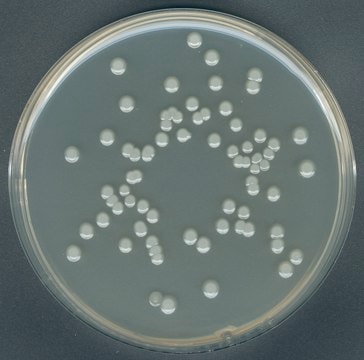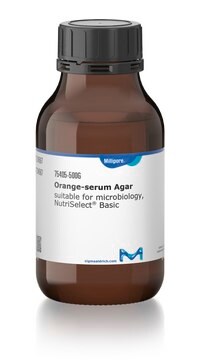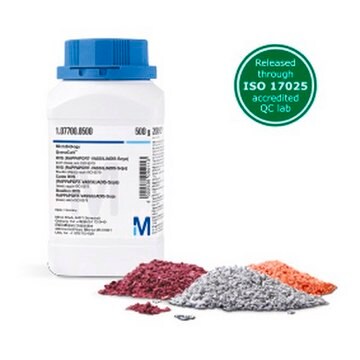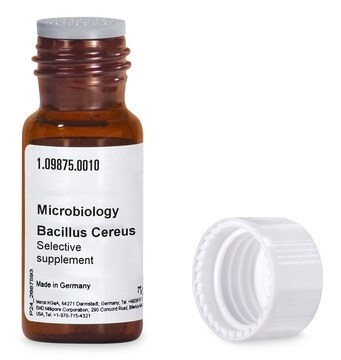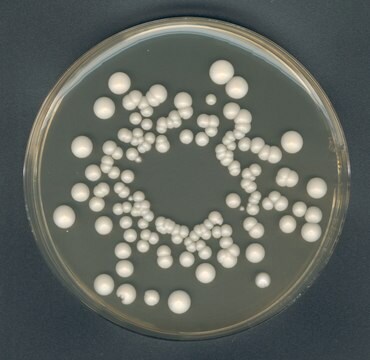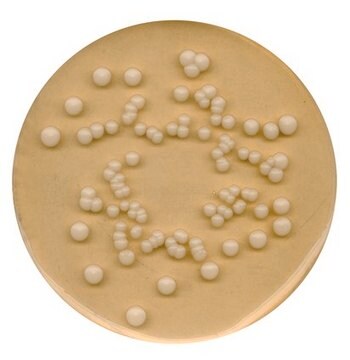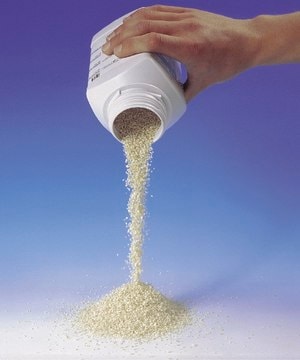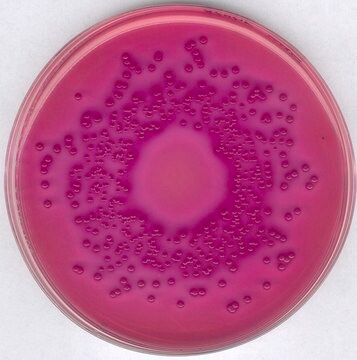おすすめの製品
認証
according to IFU
品質水準
フォーム
medium granules (dehydrated (DCM))
包装
pkg of 500 g
メーカー/製品名
GranuCult®
保管条件
protect from light (Keep tightly closed and dry)
テクニック
microbiological culture: suitable
色
beige
pH
5.4-5.6 (37 °C, 42 g/L in H2O, after autoclaving)
溶解性
42 g/L
かさ密度
700 kg/m3
アプリケーション
food and beverages
microbiology
保管温度
15-25°C
適合性
molds
yeasts
関連するカテゴリー
詳細
Orange Serum Agar is developed specifically to isolate and enumerate the microorganisms that can spoil citrus fruit beverages. Due to its low pH, citrus fruit juices are susceptible to spoilage, mainly by molds, yeasts, and acidophilic bacteria such as Lactobacillus and Leuconostoc. Orange Serum Agar is recommended by APHA for the examination of fruit beverages. Casein peptone and yeast extract provide essential nitrogenous and carbonaceous nutrients and vitamin B complex. Glucose is added as a carbon and energy source. Orange extract generates an optimal environment for the enrichment of acid-tolerant microorganisms from citrus fruit samples. Dipotassium hydrogen phosphate acts as buffering substance.
アプリケーション
Orange Serum agar is suitable for the isolation, cultivation, and enumeration of acid-tolerant spoilage microorganisms in fruit juice and fruit juice concentrates from citrus fruit.
特徴および利点
- GranuCult® offers superior granulated culture media
- Safe and sustainable due to reduced risks associated with fine dust and toxic substance inhalation, resulting in a safer work environment
- Excellent wettability, solubility, and free-flowing properties
- Convenient, with minimal component separation and clumping, even under warm or humid conditions
- High batch-to-batch reproducibility
- Prolonged shelf life of up to five years
- High number of test strains exceeding all regulatory demands
- Granulation technology allows many supplements to be included, with no need to add these separately
アナリシスノート
Appearance (clearness): clear to opalescent
Appearance (color): yellowish to yellowish-brown
pH-value (25 °C): 5.4 - 5.6
Growth promotion test in accordance with the current version of DIN EN ISO 11133.
Inoculum on reference medium (Bacillus cereus ATCC 11778 (WDCM 00001)):
Inoculum on reference medium(Lactobacillus plantarum ATCC 14917 (WDCM 00104)):
Inoculum on reference medium (Lactobacillus casei ATCC 393 (WDCM 00100)):
Inoculum on reference medium(Leuconostoc mesenteroides ATCC 9135 (WDCM 00108)):
Inoculum on reference medium (Candida albicans ATCC 10231 (WDCM 00054)):
Colony count (Bacillus cereus ATCC 11778 (WDCM 00001)):
Colony count (Lactobacillus plantarum ATCC 14917 (WDCM 00104)):
Colony count (Lactobacillus casei ATCC 393 (WDCM 00100)):
Colony count (Leuconostoc mesenteroides ATCC 9135 (WDCM 00108)):
Colony count (Candida albicans ATCC 10231 (WDCM 00054)):
Recovery on test medium (Bacillus cereus ATCC 11778 (WDCM 00001)): ≥ 70 %
Recovery on test medium (Lactobacillus plantarum ATCC 14917 (WDCM 00104)): ≥ 70 %
Recovery on test medium (Lactobacillus casei ATCC 393 (WDCM 00100)): ≥ 70 %
Recovery on test medium (Leuconostoc mesenteroides ATCC 9135 (WDCM 00108)): ≥ 70 %
Recovery on test medium (Candida albicans ATCC 10231 (WDCM 00054)): ≥ 70 %
Growth (Aspergillus brasiliensis (formerly A. niger) ATCC 16404 (WDCM 00053)): good to very good
Incubation: 4 days at 26 ± 2 °C, aerobic
A recovery rate of 70 % is equivalent to a productivity value of 0.7.
The indicated colony counts result from the sum of a triple determination.
Reference media: Tryptic Soy Agar resp. SABOURAUD agar
Appearance (color): yellowish to yellowish-brown
pH-value (25 °C): 5.4 - 5.6
Growth promotion test in accordance with the current version of DIN EN ISO 11133.
Inoculum on reference medium (Bacillus cereus ATCC 11778 (WDCM 00001)):
Inoculum on reference medium(Lactobacillus plantarum ATCC 14917 (WDCM 00104)):
Inoculum on reference medium (Lactobacillus casei ATCC 393 (WDCM 00100)):
Inoculum on reference medium(Leuconostoc mesenteroides ATCC 9135 (WDCM 00108)):
Inoculum on reference medium (Candida albicans ATCC 10231 (WDCM 00054)):
Colony count (Bacillus cereus ATCC 11778 (WDCM 00001)):
Colony count (Lactobacillus plantarum ATCC 14917 (WDCM 00104)):
Colony count (Lactobacillus casei ATCC 393 (WDCM 00100)):
Colony count (Leuconostoc mesenteroides ATCC 9135 (WDCM 00108)):
Colony count (Candida albicans ATCC 10231 (WDCM 00054)):
Recovery on test medium (Bacillus cereus ATCC 11778 (WDCM 00001)): ≥ 70 %
Recovery on test medium (Lactobacillus plantarum ATCC 14917 (WDCM 00104)): ≥ 70 %
Recovery on test medium (Lactobacillus casei ATCC 393 (WDCM 00100)): ≥ 70 %
Recovery on test medium (Leuconostoc mesenteroides ATCC 9135 (WDCM 00108)): ≥ 70 %
Recovery on test medium (Candida albicans ATCC 10231 (WDCM 00054)): ≥ 70 %
Growth (Aspergillus brasiliensis (formerly A. niger) ATCC 16404 (WDCM 00053)): good to very good
Incubation: 4 days at 26 ± 2 °C, aerobic
A recovery rate of 70 % is equivalent to a productivity value of 0.7.
The indicated colony counts result from the sum of a triple determination.
Reference media: Tryptic Soy Agar resp. SABOURAUD agar
脚注
We offer two media types: the superior granulated GranuCult® and the cost-efficient powdered NutriSelect® culture media, depending on your needs.
The designations basic, plus, or prime are added to indicate the quality control level, from basic quality control to standard QC plus to prime for full regulatory compliance.
The designations basic, plus, or prime are added to indicate the quality control level, from basic quality control to standard QC plus to prime for full regulatory compliance.
法的情報
GRANUCULT is a registered trademark of Merck KGaA, Darmstadt, Germany
NutriSelect is a registered trademark of Merck KGaA, Darmstadt, Germany
保管分類コード
11 - Combustible Solids
WGK
WGK 3
試験成績書(COA)
製品のロット番号・バッチ番号を入力して、試験成績書(COA) を検索できます。ロット番号・バッチ番号は、製品ラベルに「Lot」または「Batch」に続いて記載されています。
ライフサイエンス、有機合成、材料科学、クロマトグラフィー、分析など、あらゆる分野の研究に経験のあるメンバーがおります。.
製品に関するお問い合わせはこちら(テクニカルサービス)